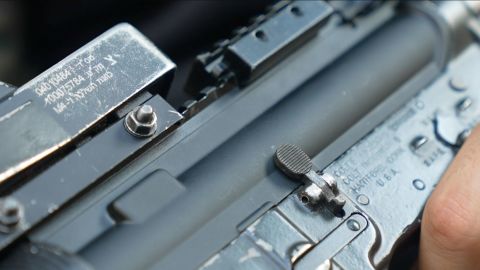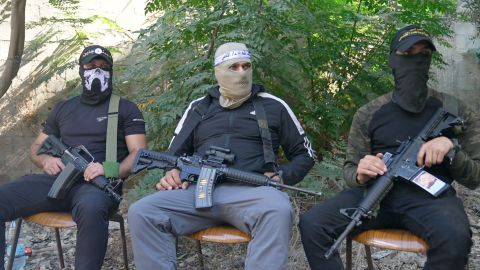Jenin Refugee Camp, West Bank
CNN
—
Four US-made M4 Carbine rifles lean against the back of the sofa. The young men, mostly dressed in black civilian clothes, are relaxed and chatty. Neighbors pop their heads in to say hello through a door open to the street.
Which is odd.
Because these men are being hunted, targeted for kill-or-capture in a new Israeli military campaign to try to stamp out a fast-growing armed insurrection in the north of the West Bank.
The six men sip tea. The Israel Defense Forces (IDF) says it’s hunting them because they’re members of an armed militant group that’s planning more attacks against Israeli targets.
“Martyr posters” cover most of the back wall. Young men from the Jenin Brigade, most of them killed in fighting with Israeli troops, smile from their photographs at their living comrades across the room. The men now fiddling with their phones know they themselves may move from the sofa to that wall. An Israeli military strike team could attack at any time.
This is Jenin Refugee Camp. It’s less than half a kilometer square, home to about 12,500 people and a hotbed of armed resistance against the Israeli occupation of the West Bank – and the existence of the Jewish state itself – for more than 20 years. Its tight alleys and ramshackle homes are densely packed, and crackle with tension.
At midday it’s shuttered while the neighboring town of Jenin is raucous with life. Locals say people mostly sleep during the day because at night there’s often fighting.
Earlier this year, eight Israeli civilians were killed in attacks in Tel Aviv and nearby Bnei B’rak by gunmen from around Jenin. Both of the militants in those incidents were killed.
There has been a surge in armed assaults on Israeli troops and civilians this year. According to the IDF, there have been around 180 shooting incidents in Israel and the occupied territories this year, compared to 61 shooting attacks in 2021. The Israeli military and police have seized 900 weapons from Palestinians.
Two days after we met, another Palestinian youth, aged 19 and a member of the Jenin Brigade’s militant armed group, was killed when Israeli forces stormed Jenin in an operation against the militants.
“Jenin is the hornets’ nest,” says IDF spokesman Lt. Col. Richard Hecht.
Some of the M4 weapons cradled by the Palestinian militants have Hebrew etched onto them. “Senior Israeli commanders steal the weapons and they sell them. We buy them on the black market with money we raise ourselves,” claims a leader with the Jenin Brigade at our secret meeting in Jenin Refugee Camp.
In 2020 a report by Israel’s Knesset estimated that 400,000 illegal weapons were circulating in Israel. The IDF admits that weapons have been stolen but denies that “senior commanders” are likely to be involved.
Many, the IDF said, are smuggled into the West Bank. Hecht admits: “We’re putting a big effort into the connectivity between criminal gangs and terrorism.”
It’s been the bloodiest 10 months since 2015 – at least 131 Palestinians (not counting Gaza) and 21 Israelis or foreigners have been killed this year.
But there’s been a shift, too, not just in the level of armed attacks against Israeli targets and Israel’s campaigns – but a growing resentment towards the leadership of the Palestinian Authority (PA).
Indeed, the militants of the Jenin Brigade who sit in the shade of olive trees to hide from Israeli surveillance drones had a barely hidden threat to make against the PA.
“This is a message to the Palestinian leadership: if they believe in the will of the Palestinian people, they have to join the resistance and give the resistance fighters the freedom to defend and protect our people,” says the man who leads this delegation of fighters.

Without explicitly threatening the PA leadership, he said that it was hemorrhaging support even among the ranks of its own security forces. Numerous members of the PA’s police force and other security agencies have been involved in attacking Israeli forces, he said.
Under agreements signed with Israel under the so-called Oslo peace process, the PA is supposed to cooperate on security issues with Israel.
Many other Palestinian factions condemn this as “collaboration” and, according to officials in the Israeli military, security cooperation has almost broken down in the north of the West Bank, especially around Jenin and nearby Nablus.
In 1999, members of Fatah, the main group in the Palestine Liberation Movement which still dominates the PA, were beginning to condemn their own leader openly. Back then that was Yasser Arafat – who had led the Palestinian cause for years.
Arafat’s successor at the head of the PA is Mahmoud Abbas, known as Abu Mazen. At 87 his grip has slipped and a growing level of defiance against all that his authority has apparently failed to achieve is driving opposition in the West Bank.
The Jenin Brigade’s demands of the Palestinian Authority to join a new fight last week prompted PA Prime Minister Mohammad Shtayyeh to visit Jenin Camp.
He stood next to Fathi Hazem, the father of two sons killed by Israel – one who murdered three Israelis in Tel Aviv in a shooting attack at a bar. Both had been members of the Jenin Brigade.
Whether out of choice or a need for political survival, the PA’s “security cooperation” with the Israelis in the north of the West Bank has dwindled to almost nothing, an Israeli government official said.
This may be because any attempt to do so risks igniting a civil war between Palestinian militants and the Palestinian Authority.
The apparently unstoppable march of Israeli settlements into the West Bank, while peace talks with Israel have ceased, means that many Palestinians have no real hope of an independent or even prosperous future. This has provoked more violence.
On that, both the IDF spokesman and the fighters in Jenin Camp agree.
On the Israeli side, Lt. Col. Hecht, a former battalion commander says, “They’re frustrated and disaffiliated and they are saying to all the organized Palestinian groups and the PA, ‘we have had enough of you all – we’re sons of the Camp.’ They don’t identify with the five-star leadership of the PA in their fancy hotels around the world. They’re now saying we’re fighting for their manhood.”
And in the West Bank, the Jenin Brigade leader concurs: “All Palestinian people – as a result of the [Israeli] occupation’s daily violations, and invasions, and the formation of many extreme right-wing governments [in Israel] that weakened the PA and its organizations and leadership – have lost trust in all of the PA organizations.”

“Most of our Palestinian youth that fight and are martyred have a university or college degree. They’ve lost hope of a dignified life,” he adds.
But, we asked, given that during the last 20 years, the Israelis have got more settlements, and there has been no progress to independence from the Palestinian perspective, maybe a new path should be found? Isn’t it time to put down your weapons and switch to non-violent protest?
He replies: “The occupation killed off all of the peaceful solutions, and here, on this land, there is no place for peaceful solutions with this Zionist Israeli occupation.”
Asked if they are of the view that the Jewish state should be wiped out, he replies: “All armed factions and every militant does not believe in a two-state solution because this occupation did not, and will not, respect any peaceful agreement. I repeat this again, those [Israeli governments] are criminal gangs.”
Does this mean that the two sides are stuck in a fatal embrace? “We always aim for victory, and not death. This occupation is sending messages to the international community that we are terrorists. We are not terrorists, we are resistance fighters for freedom,” the commander replies.
But he agrees there are more young men flocking to the armed groups and setting up on their own.
In Nablus, a group known as the “Lion’s Den” is growing fast, outside the control of the PA or even Hamas or Islamic Jihad.
According to the IDF, “they think up a target and then go and ask funding from Hamas or Islamic Jihad but they don’t take orders from anyone.” Israeli forces are intent on trying to break up these armed groups and reduce the threat to Israel, Hecht says.
“We’re very focused on precise intelligence: we’re trying to contain it when we see ticking bombs, the movement of weapons, rhetoric and warnings online – then we move to stop it,” he adds.
On Tuesday, joint Israeli security forces raided Nablus, targeting what they said was the leadership of the Lion’s Den and an explosives factory. At least five Palestinian men were killed in the raid.
In Jenin, the Palestinian brigade commander talks of plans for operations with militants across the West Bank and abroad that would “spark a regional war” that would come out of the camp.
But the more the conflict grows and the bloodier it gets, the greater the chance of the Palestinian Authority being sucked into direct conflict with Israel – or that the PA leadership which governs most of the 3.1 million population, dissolves itself. The latter possibility is the outcome Israel most fears.
If the Palestinian leadership in the PA disbanded and returned to full-time resistance across the whole of the West Bank, Israel would have to physically police the whole region – and pay for it.
“The PA collapsing or dissolving is the biggest threat. Having us go back into the towns would be a living nightmare,” says the Israeli government official.
This would turn the clock back to the days before the Oslo peace process. To when Palestinian groups ran a worldwide violent campaign, including terrorist attacks, in the name of freedom. To when Israel was largely isolated internationally – and had to use its own money to fund its responsibilities to Palestinians living under its occupation.
That may be exactly what the Jenin Brigade and others may be hoping for.